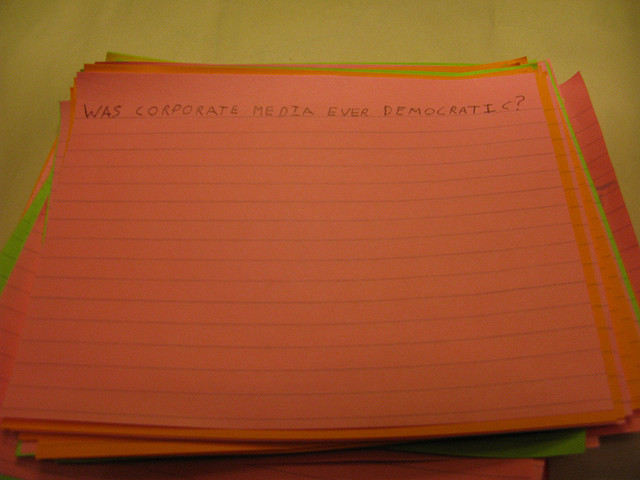Corporate media can’t be all things to all people, but its ability to set the agenda for self-serving interests shouldn’t be underestimated, since it inflicts great harm on the world. Its selective coverage deliberately veils windows to the world that need to be exposed.
For example, when Canada announces that it is ramping up its arms dealing to Colombia and Saudi Arabia, the media coverage is accurate in the details, but conspicuously absent in comprehensiveness.
The corporate agenda, as reflected in media messaging, prefers to suppress the far-reaching consequences of Canada’s growing military-industrial complex.
Industrial warfare is fuelled by arms-dealing. It’s a symbiotic relationship: war equals corporate profits. If authoritarian countries such as Saudi Arabia need more weapons, it’s good for business. This, however, creates a conflict of interest. Since war is good for the armaments industry, the military-industrial complex is tacitly if not overtly supportive of war.
The case might be made for self-defence, but evidence indicates otherwise.
Imperial hegemony and the control of resources tilt the scales heavily in the opposite direction.
When Saudi Arabia and the U.S. arm their al Qaeda allies in Syria, they are not doing it to protect their respective sovereignties. Nor are countries acting in self-defence when they wage wars of aggression in Afghanistan, Iraq, Libya or elsewhere.
The corporate media lens invariably suppresses the on-the-ground realities of modern industrial warfare though.
Could the profit motive be part of the matrix of reasons which preclude comprehensive coverage? The unqualified answer is Yes. Imperial warfare would be much harder to sell, and much less profitable, if the masses were inundated with narratives of war’s impacts on humans, rather than narratives of profits, sleek technologies and the savage “Other.”
Shaping our collective mental landscape to accept other countries, and their inhabitants, as evil, or worthy of being massacred and hated, would be much more difficult if media coverage was more comprehensive. It would also be bad for the business of globalized monopoly capitalism.
How easy is it to hate Iraqis, or to think that they deserve their fate once we internalize the reality that 500,000 people, mostly children, died as a result of the West’s economic sanctions that preceded the second (and very illegal) war in Iraq?
How easy is it to vilify them once we internalize that the illegal invasion resulted in 655,000 excess deaths by 2006, and likely over 1,000,000 by now, and that collateral murder is a mainstay of modern warfare? Corporations and their government fronts prefer that these facts remain obscure.
Although corporate profit is a predominant impulse which enables the barbarity of illegal warfare, it is not the only driver. However, all drivers that oppose current trajectories of globalized neoliberalism are suppressed by corporate media.
The subterranean rivers of history and their circular currents also enable the cancer of imperial conquest, and the rule of force over the rule of law.
Since the invasion of Turtle Island in 1492, the primary targets of invaders in North America have been indigenous peoples at home and abroad.
The first step in the handbook of conquest, and the creation of a de-humanized “other” is racism. The Declaration Of Independence describes the plurality of indigenous peoples in eighteenth century North America as “merciless Indian savages.” Once the process of dehumanization was completed, barbarous, inhumane acts of mass murder and extermination became rationalized. It happened in North America then, and it is happening now overseas. The newest incarnations of the “merciless Indian savages” imagery are indigenous muslims in Iraq, and Syria, who are being exterminated at this moment.
Propelled by ethnocentric, evangelical notions of Manifest Destiny and “exceptionalism”, the current racism is a foundational element of “divide and conquer” strategies to colonize the globe while the victims, described by Frantz Fanon in The Wretched Of The Earth are purposely ignored by the lens of corporate media which is complicit in the mass murders.
Needless to say, the inglorious imperial cycles of mass murder and colonial exploitation, sanitized through the lens of corporate media, need to stop.
The West and their allies, from al Qaeda in Syria, to the neo-Nazis in the Ukraine, must follow the multilateral rule of international law — as must all polities — rather than the rule of force.
Decolonization, and a Fourth World paradigm, as described by George Manuel/Michael Posluns in The Fourth World An Indian Reality and Anthony James Hall’s Bowl With One Spoon series, must be embraced and fortified so that cultures of Life and Democracy can subordinate today’s predominant trajectories of Death and Totalitarianism.
Mark Taliano is a writer, activist and retired teacher.
Photo: flickr/Rodger Levesque



